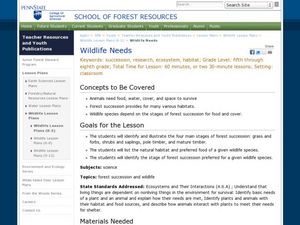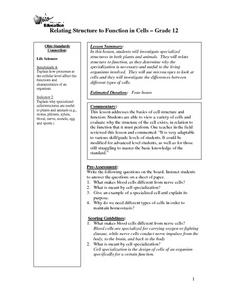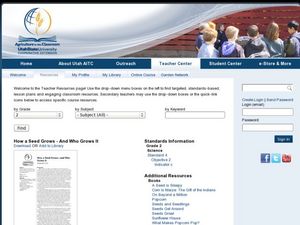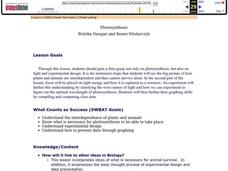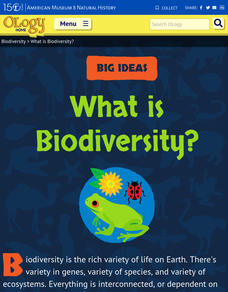Curated OER
Do You Need What I Need?
Student identify the basic human needs. In this life science instructional activity, 3rd graders compare the needs of plants, animals and humans. They apply what they have learned by playing a survival team game.
Curated OER
A Walk in the Forest
Students explore interrelationships among plants and animals. Students listen to Where to, Little Wombat? by Charles Fuge, and contribute words and phrases for a classroom animal and plant survival chart. Students take a walk in a...
Curated OER
Life Systems- Zoo Central
Students investigate the various aspects associated with living things while also concentrating on their basic needs. They explore the aspects of movement and growth in plants and animals. This is done through research and other...
NASA
Biology Training Module
Are you a koalafied biologist? The lesson begins with research about human survival and our ecosystem. Then, an online training module simulates the effects of changes to the plants and animals in an ecosystem. Finally, scholars research...
Curated OER
Growth and Changes in Plants
Students investigate the growth and changes in plants. They view a video and discuss the changes in plants. They work in small groups to demonstrate vocabulary words to the class. They visit a green house and take pictures of plants to...
Curated OER
Wildlife Needs
Students identify the wildlife needs in a specific setting. In this wildlife needs lesson, students identify and illustrate the four stages of forest succession. Students list the natural habitat and food for a given species. Students...
Curated OER
Dinosaurs
Students are introduced to the various types of dinosaurs and write in their journals about their favorite one. After listening to a story and watching a filmstrip, they color a few pages in their Dinosaur Friends Book. They also examine...
Curated OER
Changing Climate, Changing Animals
Students review teacher-provided background materials on impact of climate change. Students then work in small groups to make poster on possible impacts of climate change on one particular northern animal, and how it might affect people...
Curated OER
What Do We Need In Our Environment To Survive?
Young scholars discuss and write about waste management to save the environment. In this environment lesson, students discuss what an alien coming to Earth would notice about the environmental needs of humans for survival. They pretend...
Curated OER
Fire Fighting
Students consider the effects of a wildfire on prairie life. They explore the ways that plants regenerate after a fire and create fictional plants that have adapted specifically to the prairie environment. They share models of their plants.
Curated OER
What Is It?
Play the game of Tag and differentiate between plants and animals. Explore the characteristics of plants. Identify the major parts of plants (e.g., seeds, stem, pistil) and describe their basic functions. Compare the requirements of some...
Curated OER
Relating Structure to Function in Cells
Twelfth graders investigate specialized structures in both plants and animals. They relate structure to function, as they determine why the specialization is necessary and useful to the living organisms involved. They use microscopes...
Curated OER
How a Seed Grows and Who Grows It
First graders explore biology by viewing PowerPoint presentations in class. In this plant life lesson, 1st graders identify the life cycle of a plant and how to properly plant a seed outside. Students view a movie about plant life and...
Curated OER
Little Red Hen
First graders explore biology by identifying plant anatomy in class. In this botany lesson, 1st graders read the book The Little Red Hen and identify the methods used in order to grow successful plants. Students discuss other ways people...
Curated OER
Photosynthesis
Students recognize the importance of plants as they perform an experiment involving photosynthesis. Students determine the optimum wavelength of light for photosynthesis by exposing plants to different colors of light, collecting data,...
Curated OER
Fable of the Fainting Goat
Second graders explore animal life by reading children stories in class. In this goat fable lesson, 2nd graders read several books which describe the different myths and folklore about goats. Students identify the needs of living animals...
Curated OER
What Were Dinosaurs Like?
Students compare and contrast dinosaurs to animals that are alive today through basic research.
Curated OER
Fabulous Fossils
Seventh graders investigate how fossils are formed and discuss how scientists determine the appearance of ancient plants and animals. They make fossils of everyday objects for others to identify. They make spreadsheets to display fossil...
Curated OER
Summer Camp in the Classroom
Students explore wildlife plants and summer activities. In this natural science lesson, students identify plants and animals and create a scrapbook of their findings.
Curated OER
Life Cycles
Using computers, Students work in small groups and progress through the roles of Explorer, Researcher, Designer, and Evaluator as they study the life cycle of plants, insects, butterflies and frogs.
American Museum of Natural History
What is Biodiversity?
Not all dogs are the same just like not all finches are the same. An interactive online lesson helps individuals learn about the causes and limitations to biodiversity. The clickable sections describe the basics of the genetics of...
Curated OER
Parts of a Plant
Students explore biology by listening to an in-class lecture. In this plant science lesson, students sing songs with their classmates regarding anatomical parts of a plant and create plants from arts and crafts materials. Students listen...
Curated OER
Where Do Your Veggies Grow?
First graders investigate the origins of vegetables. In this Science lesson, 1st graders identify where fruits and vegetables come from. Students describe how people utilize plants.
Curated OER
Explore the Food Web
Students identify plants and animals in the journals of Lewis and Clark's expedition. They describe the various animal habits. Students interpret the behaviors of the animals discovered on the expedition. They design a food web using...





